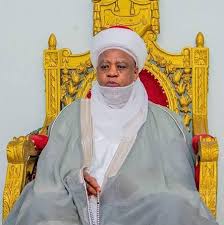*Calls for reform, alternative structure The Middle Belt Forum (MBF) has expressed strong opposition to a clause in the National Council fo
*Calls for reform, alternative structure
The Middle Belt Forum (MBF) has expressed strong opposition to a clause in the National Council for Traditional Rulers of Nigeria (Establishment) Bill, 2024, which proposes that the Sultan of Sokoto and the Ooni of Ife serve as permanent co-chairmen of the council.
In a press statement signed by its National Spokesman, Luka Binniyat, and released from Abuja on Saturday, the MBF described the clause as “deeply troubling,” “historically revisionist,” and “a threat to Nigeria’s federal character and secular foundation.”
The Bill, sponsored by Senator Simon Bako Lalong (Plateau South), a respected son of the Middle Belt and Gwad-Goemai of the Goemai ethnic nation, passed its second reading in March 2025 and is currently under consideration by the Senate Committee on Establishment and Public Service.
While the MBF stated it would leave Southern stakeholders to determine their position on the inclusion of the Ooni of Ife, it was unequivocal in its rejection of the institutionalisation of the Sultan of Sokoto as permanent co-chairman.
“This rejection is anchored on strong historical, cultural, constitutional, and moral grounds,” the Forum declared.
Historical Seniority Over the Sokoto Caliphate
The MBF argued that several ancient kingdoms of the Middle Belt predate the Sokoto Caliphate. Among them is the Kwararafa Confederacy, which thrived between the 800s and 1700s A.D. and whose spiritual heir is the Aku Uka of Wukari.
“The Sultan of Sokoto can therefore not supersede the Aku Uka of Wukari in status and prestige to sit over him as Chairman of the Traditional Council created by law,” the Forum stated.
It further highlighted the historical prominence of the Attah of Igala, the Tor Tiv, Ochi Idoma and the Etsu Nupe, asserting that each of these traditional rulers embodies cultural institutions that flourished independently and often in defiance of Sokoto’s historical ambitions.
“The Igala Kingdom never came under the Caliphate’s domain,” the Forum stated. “The Tiv Nation, acephalous and unconquered, has always been fiercely independent. The Nupe Kingdom predates the Sokoto Caliphate by several centuries.”
Perhaps more controversially, the MBF warned that giving the Sultan of Sokoto a permanent co-chairmanship role would elevate a religious figure to a national position in a way that undermines Nigeria’s secular foundation.
“The Sultan is primarily a religious leader. He is the spiritual head of all Nigerian Muslims, especially in the 19 Northern States and the FCT,” the statement read. “To place him at the head of a secular, national institution would alienate non-Muslims and violate the spirit of the Constitution.”
The Forum also noted that the Sultan’s position as the permanent patron of the Miyetti Allah Cattle Breeders Association of Nigeria (MACBAN)—an organisation it accuses of being linked to violent Fulani herdsmen—further complicates his acceptability as a unifying national figure.
“The Sultan has not done enough to condemn or dissociate himself from atrocities carried out by Fulani militia, especially in the Middle Belt,” it stated. “Making him a permanent co-chairman under such circumstances is a grievous insult to the victims of this violence.”
Colonial Legacy and Continued Subjugation
The MBF traced its rejection back to colonial policies that imposed indirect rule by Northern Emirates over autonomous Middle Belt communities.
“While Hausaland fell under Usman Dan Fodio’s forces in the early 1800s, the Middle Belt remained largely unconquered, preserving its distinct identity and sovereignty,” the Forum said.
It argued that British colonial authorities imposed an artificial hierarchy by granting influence to Fulani-led Emirates over the Middle Belt’s indigenous peoples.
“Sixty-five years after Nigeria’s independence, the Middle Belt can no longer accept a subordinate position to the Sultanate of Sokoto or any traditional institution that does not reflect our history, culture, or aspirations.”
The Forum proposed that the chairmanship of the National Council for Traditional Rulers be rotational and tenure-based, or, alternatively, democratically elected by traditional rulers across the country.
“This will ensure fairness, dignity, and representation across Nigeria’s plural traditional landscape,” the Forum added.
In the event that the Bill is passed with the controversial clause intact, the Forum warned of a Middle Belt-wide boycott.
“If the Senate passes this bill with the contentious clause and it is assented to by the President, we will mobilise all ethnic nationalities across the Middle Belt to boycott participation in the Council,” Binniyat warned.
The MBF also declared that Middle Belt traditional rulers would not attend any meeting of a council “whose leadership is permanently skewed in favour of a non-indigenous, religiously aligned and lesser monarch.”
Instead, the Forum pledged to establish an autonomous Council of Middle Belt Traditional Rulers that would “reflect the historical, cultural, and moral values of our people.”
In conclusion, the forum asserted, “The Middle Belt Forum stands firm in its belief that true national cohesion can only be achieved through fairness, mutual respect, and recognition of our rich historical diversities.”
It vowed to, “resist any attempt to impose a permanent religious figurehead on a national institution of traditional rulers using every lawful and democratic means available.”




COMMENTS